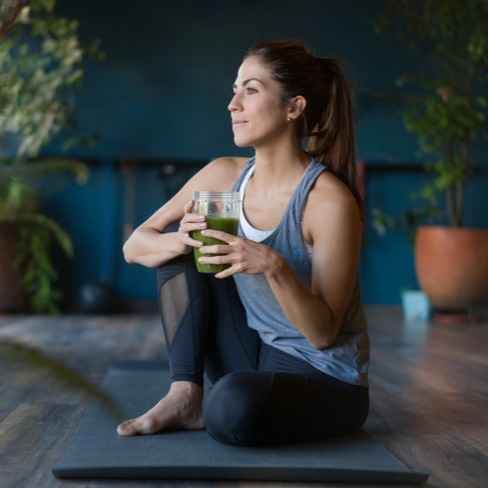Is it time for a “Dry” month?
By: Dr. James Aw, Chief Medical Officer, OMERS
October 21, 2022
Often, it’s a life event that will cause us to set resolutions for personal wellness, be it a large change, a sick family member, or even a fun group challenge. We try to lose some weight, eat healthier, exercise more, sleep better and work on stress management. We set goals and work to stay motivated!
Many individuals also try to drink less alcohol, with the social and physical risks of excessive drinking becoming better known. In recent years, “Dry January” has become popular globally. The concept is to avoid having alcohol for a month to give your body a break. As I say to patients – your body needs to be reminded about what it feels like to not have alcohol running through your veins. Excess is often jet fuel for most preventable illnesses. Examples of past global campaigns include “Dry January Canada” (MADD, 2021), “Dry Feb” (Canadian Cancer Society, 2021), “Dry January” (Alcohol Concern, UK, 2013), “On the Dry” (Irish Heart Foundation, Ireland, 2015), “Dry July” (Australia, 2008) and Buddhist Lent Abstinence Campaign (StopDrink Network, Thailand, 2003).

A patient of mine taught me about another approach called “One, one and one” which I often share with patients. Take one month off a year, one week every month and one day a week to abstain from alcohol. This approach gives you some autonomy to choose the times of the year and it also allows your body to have a break from alcohol on a regular basis.
But does “Dry January” improve one’s health or is it simply a short-term “circuit breaker”?
Fortunately, studies have shown that one month of abstinence amongst heavy drinkers has a positive effect on improving insulin resistance, blood pressure, body mass and cancer-related growth factors. Follow-up studies at six months after temporary abstinence also led to less frequent drinking, lower volume and an increased confidence to resist alcohol. Temporary alcohol abstinence also improves self-reported sleep quality, energy levels, concentration and well-being. However, a 2021 UK study evaluated the “Dry January” campaign between 2015 and 2018 (37,142 respondents to the Alcohol Toolkit Study) and did not find a statistically significant large decline in alcohol consumption detectable at the population level.
Reset your relationship with alcohol
The UK “Dry January” campaign has been promoted as “the perfect way to reset your relationship with alcohol”. A classic book by Caroline Knapp named “Drinking: A Love Story” (1997) describes her challenges as a “functioning” alcoholic from a successful upper-class family who used alcohol as “liquid armor” to escape personal relationships and the realities of life. Problem drinking is a slippery slope, from social drinking to habit-forming behaviours. Studies have shown that social rituals and pressure to drink alcohol make it difficult to abstain. Learning about one’s own personal drinking habits (patterns, amount, calories) can be achieved through digital tools like Drinkaware (Drinkaware Home | Drinkaware) that also does population-based research. The Centre for Addiction and Mental Health (CAMH) also has a free app, Say When: How to quit drinking or cut down, available via Apple iPhone and Android devices.”
Success in abstinence is linked to social support, continuous self-monitoring, careful planning of social activities that can involve drinking and consumption of alcohol-free drinks. These are common behaviour change techniques that can be applied to other health conditions (i.e. healthy behaviour substitution, goal setting, self-monitoring and social support).
Commonly used self-assessment tools for at-risk drinking include the CAGE and AUDIT questionnaires below:
CAGE questionnaire
Have you ever felt you should Cut down on your drinking?
Have people Annoyed you by criticizing your drinking?
Have you ever felt bad or Guilty about your drinking?
Have you ever had a drink first thing in the morning to steady your nerves or to get rid of a hangover (Eye opener)?
Item responses on the CAGE questionnaire are scored 0 or 1, with a higher score an indication of alcohol problems. A total score of 2 or greater is considered clinically significant.
AUDIT questionnaire
https://auditscreen.org/
For any questions you may have regarding abstaining from alcohol or any other medical condition, you should always seek the immediate or timely advice of your physician or other qualified health care provider.
While January is a great time to reflect on the past year and focus on the future, this is possible throughout the year. Improving and sustaining your personal wellness includes goal setting, healthy habits, action and purpose. Living well often means keeping things simple and avoiding excess. As goes the common saying, “Moderation is best in all things.”
Wishing you all happy, healthy and successful progress towards reaching your wellness goals!
References
Pandemic and Alcohol Consumption - https://pubmed.ncbi.nlm.nih.gov/33280423/; https://pubmed.ncbi.nlm.nih.gov/34159674/
Health effect of alcohol - https://www.niaaa.nih.gov/alcohols-effects-health/alcohols-effects-body
“Dry January Canada” (MADD, 2021) https://dryjanuarycanada.ca/
“Dry Feb” (Canadian Cancer Society, 2021) https://www.dryfeb.ca/
Global Dry January campaigns - https://www.ncbi.nlm.nih.gov/pmc/articles/PMC6916250/#CR9Health effects of Short Term Abstinence - https://www.ncbi.nlm.nih.gov/pmc/articles/PMC5942469/; https://pubmed.ncbi.nlm.nih.gov/26690637/
Has increased participation in the national campaign “Dry January” been associated with cutting down alcohol consumption in England - https://www.ncbi.nlm.nih.gov/pmc/articles/PMC8504198/
Benefits of temporary alcohol restriction - https://www.ncbi.nlm.nih.gov/pmc/articles/PMC6995140/#CR9
The information, content and material provided by OMERS Administration Corporation at each link on this page is provided for informational purposes only and is not intended to be, or to substitute for, medical advice. Always seek the advice of a qualified healthcare professional if you have any questions regarding a medical condition or treatment and do not disregard or delay seeking professional medical advice because of the content provided at any of the links on this page. OMERS AC and its affiliates and other investment entities are not responsible or liable in any manner for your use of or reliance on the above information.